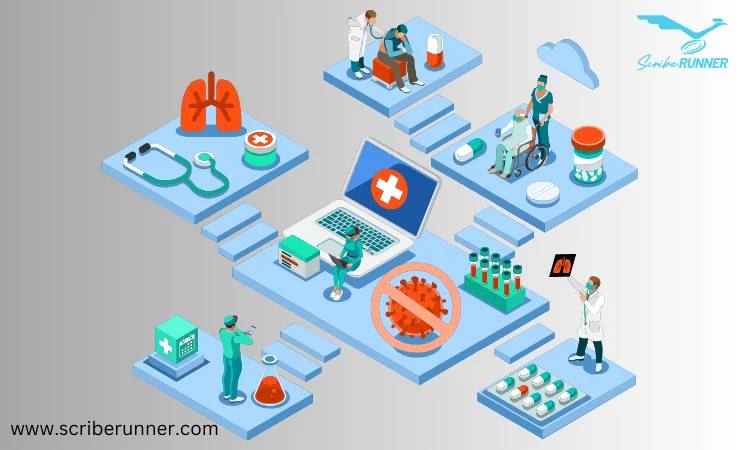As a senior manager in the hospital, imagine you start your day holding a coffee mug in your right hand and turning the page with the other hand to see daily tasks and challenges. Suddenly your phone buzzes and there is an urgent need to update patient records. The people at the front desk are overwhelmed with calls, billing queries, and other important tasks.
Seeing such overburdened tasks every morning, you quickly realize that, beyond just handling medical care, the real challenge lies in managing the administrative tasks that are important to keep operations running efficiently and smoothly.
Virtual Medical assistance has been helping the medical business for the last two decades still some businesses are reluctant to stick with the in-house staff. That is why despite the evolution of digital solutions, the hospital is still confused about deciding on whether they should stick with the traditional staff or reduce cost and burden through outsourced medical scribing.
Let’s explore both options and see which might be the right fit for your medical business.
The Role of Virtual Medical Assistants: A Digital Helping Hand

A Virtual Medical Assistant is a remote professional who processes administrative and clinical tasks—such as patient records, setting appointments to insurance claiming through supporting telehealth services. Often at a fraction of the cost, they combine digital skills and flexibility that you might otherwise have trouble finding in new internal hires.
If we look at the advantageous side of virtual assistants, first, they are not bound to work just in the limited and specified work hours, they are available any time for meetings, information, and support to your practices and patients. As you don’t need to arrange space and equipment, they become cost-effective sources for your medical billing and other assistance services.
But what makes virtual medical asistants so appealing? Let’s break it down:
Save Money: One of the benefits of virtual assistants is that you are only paying for their work — not things like salaries, computers, and office space. And you pay for the exact help that is required, be it part-time or full-time, and only till a given project.
Flexibility: do you need extra assistance during busy hours or after the fellow’s typical workday? In addition, virtual medical asistants are scalable and can provide support as needed on-demand anywhere.
Ability to Leverage Expertise: Without virtual medical asistants, you are restricted to the skills of talent that reside in your area but with these resources available at any time from anywhere and are uniquely trained or skilled (for example- medical administration skill set Vs. coding/billing).
The Strengths of In-House Staff: Familiar Faces and On-Site Support

On the other hand, your in-house staff is the backbone of your hospital. They offer personalized care for your parents, make direct communication with the admin and the clients, and above all have a deep understanding of the organization’s hierarchy, culture, and values.
Does it mean the In-house staff is more valuable than virtual remote assistants? The above statement does not directly reflect this but shows the importance of in-house medical assistants just like the remote assistant.
Benefits of In-House Medical Staff.
Personalized Interaction: Your employees have no trouble remembering the names of your patients. These are the faces that patients feel at ease with and cared for by…a trust that is not easily replicated over the phone or from miles away.
On-Site Presence Some tasks can only be managed by an in-house team — taking vital signs and handling physical paperwork. An onsite presence means that you get rapid response and instant problem-solving.
This is one of the team cohesion In-house staff get absorbed in your hospital’s day to night rhythm. People know what challenges they face on a day-to-day basis, the workflows, priorities, and thus work comes as a team sport with faster turnarounds.
Which Option is Best for Hospitals and Medical Organizations?

Patient Experience Matters:
In-house staff can establish personal connections with patients; hence, they become familiar faces that the clients feel confident to approach. Continue Reading virtual medical asistants can, however, help add value to the patient experience by relieving your on-site staff of some administrative duties so they have more time to devote directly caring for and connecting with patients.
The trick is finding the sweet spot where virtual medical asistants are augmenting, not replacing in-house staff to achieve maximum patient satisfaction.
Budget Constraints:
virtual medical asistants can be a sound and cost-effective option for hospitals aiming to lower costs without lowering quality. They reduce costs associated with office spaces, equipment, and full-time salaries and inform of flexibility to control the size of staff as needed. The speed and cost-effectiveness of this technology can be especially advantageous for smaller hospitals or under-resourced healthcare systems.
Service Flexibility:
Healthcare never sleeps, and your support shouldn’t either. virtual medical asistants offer a unique advantage by providing 24/7 coverage across different time zones, which is especially valuable for practices with after-hours needs or for managing unexpected patient surges. This flexibility ensures that your hospital remains operational and responsive at all times, providing continuous care without the need to overburden your in-house team.
Technology Adoption:
If your hospital already embraces digital tools for patient management, integrating a virtual medical asistant could be seamless and highly effective. virtual medical asistants are typically skilled in using various software and digital platforms, allowing them to quickly adapt to your hospital’s specific systems and workflows. However, if your hospital is less tech-savvy, you might need to invest in training and technology upgrades to maximize the benefits of a virtual medical asistant.
Summing It Up
The choice of selecting between virtual assistance and in-house staff for medical assistance depends on the needs of every business. But still, many businesses prefer to choose both, the hybrid model where the VMAs provide cost-effective, flexible, and scalable support that can enhance hospital operations, particularly related to the administrative.
But you should choose the virtual medical asistant wisely. If you are interested. Would you like to explore the benefits of integrating virtual medical asistants into your team? Discover how Scribe Runner can help your hospital stay efficient, flexible, and patient-focused

